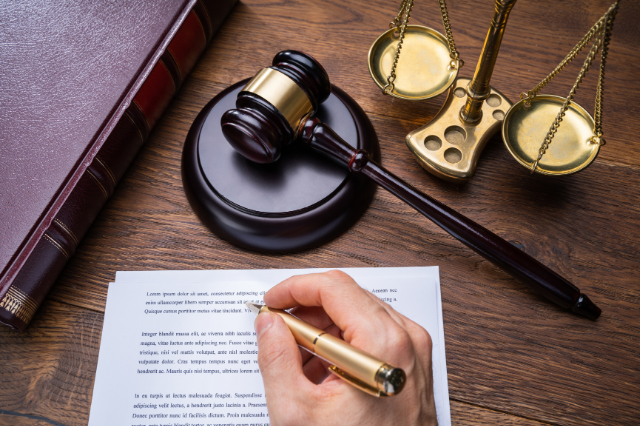Trusted criminal defense lawyer
Understand the legal implications of a Aggravated Assault charge. Conoscienti and Ledbetter provide defense strategies to protect your rights and ensure fair treatment under the law. Learn more about hate crime laws and how we can help.
 Author: J. Blake Ledbetter, Partner, Conoscienti & Ledbetter
Author: J. Blake Ledbetter, Partner, Conoscienti & Ledbetter
Mr. Ledbetter specializes in civil litigation in metropolitan Atlanta, Georgia, and possesses vast experience in wrongful death lawsuits. Mr. Ledbetter was recognized as a SuperLawyers Rising Star in 2018 and 2019 in the area of Civil Litigation. Published on May 6, 2025.

Speak with experienced criminal defense lawyer today, for free.
Atlanta Aggravated Assault Attorney
Being accused of aggravated assault in Georgia can turn your world upside down in an instant. The potential consequences are severe, threatening not only your freedom but also your future opportunities, reputation, and peace of mind. As a defendant facing the complexities of the criminal justice system alone, the situation is daunting, especially when confronted with charges as serious as this type of violent crime. Understanding the specific laws, potential penalties, and available defenses is critical, but navigating this landscape requires skilled legal guidance. If you or a loved one is facing such charges, securing representation from a knowledgeable Atlanta aggravated assault lawyer is not just advisable, it’s essential. The right criminal defense lawyer can meticulously analyze the details of your case, challenge the prosecution’s evidence, protect your constitutional rights, and fight tirelessly for the best possible outcome. At Conoscienti & Ledbetter, we understand the immense stress and uncertainty you’re experiencing, and we are here to provide the experienced criminal defense you need during this challenging time. Don’t face these serious allegations without a strong advocate, a dedicated defender, in your corner.
Understanding Aggravated Assault Charges in Georgia
When you hear the term “aggravated assault,” it signifies a serious criminal offense in Georgia, distinct from simple assault due to specific factors that elevate the charge’s severity, adding points of aggravation. Grasping the legal definition and the circumstances that lead to these charges is the first step in building a defense. An experienced Atlanta aggravated assault lawyer can help clarify these complex legal distinctions.
What Constitutes Aggravated Assault Under O.C.G.A. § 16-5-21?
Georgia law, specifically the statute O.C.G.A. § 16-5-21, precisely defines what actions constitute aggravated assault. According to this statute, a person commits aggravated assault when they assault another person under specific, heightened circumstances. These include:
- Intent to Commit Certain Felonies: Assaulting someone with the specific intent to murder, to rape, or to rob them. The focus here is on the assailant’s intent during the assault, even if the intended felony (like homicide, rape, or robbery) is not completed. This distinguishes it from lesser charges like manslaughter where intent might differ.
- Use of a Deadly Weapon: Assaulting someone with a deadly weapon. A deadly weapon is typically an item like a gun or knife, but can legally include any object used in a manner likely to cause death or serious bodily harm.
- Use of an Object Likely to Cause Serious Injury: Assaulting someone with any object, device, or instrument which, when used offensively, is likely to or actually does result in serious bodily injury. This is broader than “deadly weapon” and can include items not inherently dangerous but used dangerously in the assault, potentially even as a projectile.
- Strangulation: Assaulting someone with any object, device, or instrument likely to or actually resulting in strangulation. This specifically addresses acts of strangling intended to impede breathing or blood circulation by applying pressure to the neck or throat.
- Discharging a Firearm from a Vehicle: Assaulting someone without legal justification by discharging a firearm (expelling a projectile) from within a motor vehicle toward a person or persons. This targets drive-by shootings and similar acts.
It’s crucial to note that aggravated assault, unlike battery or aggravated battery, does not necessarily require physical contact or actual bodily harm to occur. The attempt or threat, combined with one of the aggravating factors above, can be sufficient for charges. A related charge like a terroristic threat might also apply in some situations involving threats.
Key Differences Between Simple Assault and Aggravated Assault
Understanding the distinction between simple assault and aggravated assault is vital, as the legal consequences differ dramatically. This also differs from assault and battery, where physical contact occurs.
- Simple Assault (O.C.G.A. § 16-5-20): This offense occurs when a person attempts to commit a violent injury to another person or commits an act which places another person in reasonable apprehension of immediately receiving a violent injury. Examples include swinging a fist and missing, or making a credible threat that causes fear. Simple assault is typically charged as a misdemeanor in Georgia, carrying less severe penalties than aggravated assault. However, penalties can be enhanced if committed against certain protected victims (like family members or pregnant women) or in specific locations (like public transit). Sometimes, simple assault might be considered a lesser included offense of aggravated assault.
- Aggravated Assault (O.C.G.A. § 16-5-21): As detailed above, this involves a simple assault plus an “aggravating” factor: specific criminal intent (murder, rape, rob), the use of a deadly weapon or dangerous object, strangulation, or discharging a firearm from a vehicle. The presence of any of these factors elevates the crime to a serious felony. Related charges like sexual battery or aggravated battery involve actual unwanted physical contact, often of a harmful or sexual nature.
Essentially, aggravated assault takes the core concept of assault (attempted injury or causing fear of injury) and adds elements that demonstrate a higher level of danger, intent, or potential harm. An Aggravated Assault Attorney Atlanta residents trust can evaluate the specific facts of your case to determine the precise nature of the charges you face as a defendant.
Common Scenarios Leading to Aggravated Assault Charges
Aggravated assault charges in Georgia can arise from a wide variety of situations. Some common scenarios include:
- Disputes Involving Weapons: An argument escalates, and one person brandishes or uses a knife, gun, bat, or other object capable of causing serious harm. Even pointing a gun at someone, creating reasonable fear, can qualify.
- Robbery Attempts: During an attempt to rob someone, the perpetrator threatens the victim with a weapon or uses force that puts the victim in fear of serious injury.
- Domestic Violence Incidents: Conflicts within a household or between intimate partners can lead to aggravated assault charges if strangulation occurs, a weapon is involved, or there’s intent to cause severe harm. Georgia law has specific provisions regarding assault or battery between household members. Charges like stalking might also arise in domestic contexts.
- Road Rage Incidents: If a driver discharges a firearm from their vehicle towards another person or vehicle during a traffic dispute, this constitutes aggravated assault.
- Bar Fights or Altercations: A physical fight where one party uses an object (like a bottle or chair) offensively in a way likely to cause serious bodily harm, or attempts strangulation. This could also lead to charges of disorderly conduct depending on the circumstances.
- Assaults with Specific Intent: Actions taken with the clear intent to commit murder or rape, even if unsuccessful, fall under aggravated assault. This could also involve charges related to sexual abuse depending on the specifics.
- Gang Related Activity: Sometimes aggravated assault charges arise in the context of alleged gang activity, which can bring additional sentencing enhancements.
These are just examples; any situation meeting the criteria under O.C.G.A. § 16-5-21 can result in aggravated assault charges in Georgia that prosecutors, often the district attorney’s office, pursue vigorously.

Speak with trusted criminal defense lawyer today, for free.
Severe Penalties for Aggravated Assault Convictions in Atlanta
The consequences of an aggravated assault conviction in Georgia are life-altering. It’s not merely a slap on the wrist; it’s a serious felony conviction that carries substantial prison time, hefty fines, and a lasting impact on your future. Understanding the potential penalties underscores the critical need for an experienced Atlanta aggravated assault lawyer. According to the Georgia Bureau of Investigation (GBI), an aggravated assault, a serious violent crime, occurs with alarming frequency in our state – approximately every 19 minutes and 25 seconds based on 2023 data. This highlights how seriously law enforcement and prosecutors treat these offenses.
Is Aggravated Assault a Felony in Georgia?
Yes, unequivocally. Aggravated assault under O.C.G.A. § 16-5-21 is classified as a felony offense in Georgia. This distinction from a misdemeanor (like simple assault in most cases) is crucial because felonies carry significantly harsher penalties, including longer potential prison sentences (potentially even life imprisonment in extremely rare, enhanced circumstances, though not typical for standard aggravated assault) and the loss of certain civil rights, such as the right to own firearms or vote (while incarcerated or on probation/parole). A felony conviction creates a permanent criminal record that can create lifelong obstacles for the defendant. Felony charges typically proceed via an indictment from a grand jury.
Potential Jail Time and Minimum Sentencing Guidelines
The potential prison sentence for a standard aggravated assault conviction ranges from a minimum of one year to a maximum of 20 years. However, Georgia law mandates increased minimum sentences under specific circumstances, meaning the judge often has less discretion to impose a shorter sentence if certain factors of aggravation are present. These mandatory minimums can significantly increase the time spent behind bars:
- Assault on Protected Officials:
- Public Safety Officer (Police officer, Firefighter, EMT personnel providing emergency medical services) with a Firearm (by person >=17): statutory range 10–20 years, with a mandatory minimum of 10 years that cannot be suspended or probated. (§ 16‑5‑21(c)(1)(A))
- Public Safety Officer with Weapon (not firearm, by person >=17): statutory range 5–20 years , with a mandatory minimum of 3 years that cannot be suspended or probated (O.C.G.A. § 16‑5‑21(c)(1)(B)).
- Public Safety Officer (Body Only): statutory range 5–20 years (no mandatory minimum that must be served in full). (§ 16‑5‑21(c)(1)(C))
- Correctional Officer or Officer of the Court (Judge, Prosecutor, Probation Officer): statutory range 5–20 years. (§ 16‑5‑21(k))
- Assault Based on Victim Status:
- Person 65 Years or Older: Minimum 3 years.
- Emergency Health Worker or Healthcare Worker (on hospital campus): Minimum 3 years.
- Utility Worker (performing duties): Minimum 3 years.
- Assault Based on Location or Method:
- In a Public Transit Vehicle or Station: Minimum 3 years.
- Discharging a Firearm from a Vehicle: Minimum 5 years.
- Involving a Firearm in a School Safety Zone: Minimum 5 years.
- Assault with Specific Intent:
- Intent to Rape a Child Under 14: Minimum 25 years, maximum 50 years. This could also involve related charges like sexual abuse.
- Hate Crime Enhancement: If the assault is proven to be motivated by bias against the victim’s race, religion, sexual orientation, gender, etc., a mandatory minimum of 2 years applies.
- Recidivism: Georgia has laws that can enhance penalties for repeat felony offenders (recidivism), potentially leading to much longer sentences.
These enhanced penalties demonstrate the state’s commitment to protecting vulnerable populations and deterring certain dangerous behaviors. An Aggravated Assault Attorney Atlanta relies on will meticulously examine whether any of these enhancing circumstances apply to your case.
Fines, Restitution, and Other Financial Consequences
Beyond imprisonment, a conviction for aggravated assault carries significant financial penalties.
- Fines: The court can impose fines of up to $100,000 for an aggravated assault conviction. In certain cases, such as those involving assault on a public safety officer, a minimum fine (e.g., $2,000) may also be mandated.
- Restitution: You may be ordered to pay restitution to the victim to cover medical expenses, lost wages, property damage, counseling costs, and other losses directly resulting from the assault causing bodily harm.
- Court Costs and Fees: Convictions typically come with various court costs, fees, and surcharges that add to the financial burden.
- Probation Fees: If sentenced to probation instead of or in addition to prison, you will likely have to pay monthly supervision fees.
- Bail Costs: While not a penalty of conviction, securing release via bail pending trial can be a significant upfront expense.
The cumulative financial impact of an aggravated assault conviction can be devastating, potentially leading to overwhelming debt long after any prison sentence is served.
Long-Term Consequences: Criminal Record, Gun Rights, Employment
The repercussions of an aggravated assault felony conviction extend far beyond the courtroom and prison walls. A permanent felony record creates significant, often lifelong, challenges:
- Employment: Many employers conduct background checks, and a felony conviction can be an automatic disqualifier for numerous jobs, particularly those involving trust, security, government work, or professional licenses (e.g., teaching, nursing, law).
- Housing: Landlords often run background checks, and a felony record can make it extremely difficult to rent an apartment or house.
- Gun Rights: Under federal and Georgia law, convicted felons lose their right to possess firearms.
- Voting Rights: In Georgia, convicted felons cannot vote while serving their sentence, including any period of probation or parole.
- Professional Licenses: Many professions require state licenses, which can be denied or revoked following a felony conviction.
- Educational Opportunities: Some colleges and universities may deny admission based on a felony record, and federal student aid eligibility can be affected. This can also impact cases involving juvenile delinquency.
- Immigration Status: For non-citizens, a felony conviction, especially for a crime of violence like aggravated assault, can lead to deportation.
- Social Stigma: The label of “felon” carries a significant social stigma that can impact personal relationships and community standing.
These collateral consequences highlight why fighting aggravated assault charges in Georgia is so critical. An acquittal or reduction to a lesser charge can prevent these devastating long-term effects.
Building a Strong Defense Against Aggravated Assault
Allegations
Facing aggravated assault charges in Georgia is incredibly serious, but an accusation, even leading to an arrest warrant and indictment, is not a conviction. The prosecution, represented by the district attorney, bears the burden of proof to establish guilt beyond a reasonable doubt for every element of the crime. A skilled Atlanta aggravated assault lawyer can meticulously examine the evidence obtained through discovery, identify weaknesses in the state’s case, and assert powerful legal defenses on your behalf. Building an effective defense strategy starts immediately after arrest or accusation, often before the initial arraignment.
Why Early Intervention by an Attorney is Crucial
The moments following an arrest or accusation are critical. Contacting an experienced Aggravated Assault Attorney Atlanta trusts as soon as possible offers significant advantages:
- Protecting Your Rights: An attorney ensures your constitutional rights are protected from the outset, including your right to remain silent and your right against unreasonable search and seizure. They can prevent you, the defendant, from inadvertently making statements or consenting to searches that could harm your case. A defense attorney can challenge illegally obtained evidence through a motion to suppress.
- Evidence Preservation: Key evidence, such as surveillance footage, eyewitness testimony, or physical evidence, can disappear or degrade over time. An attorney can take immediate steps to preserve crucial evidence that may support your defense.
- Early Investigation: Your criminal lawyer can begin investigating the facts immediately, interviewing witnesses while their memories are fresh, and potentially uncovering information the police officer or investigating law enforcement officer overlooked, possibly even identifying an alibi.
- Negotiation with Prosecutors: Early involvement allows your attorney to potentially engage with prosecutors before formal charges are solidified or after indictment, exploring options like charge reduction, dismissal (sometimes formally known as nolle prosequi), or alternative resolutions based on initial findings.
- Bail Hearing Representation: An attorney can represent you at bail hearings, arguing for reasonable bail conditions to allow for pre-trial release.
- Strategic Planning: The sooner your attorney understands the details, the sooner they can begin developing a tailored defense strategy, anticipating the prosecution’s moves, preparing counterarguments, and planning for a potential jury trial.
Delaying legal representation can irrevocably damage your ability to mount a strong defense against aggravated assault charges in Georgia that prosecutors bring.
Common Defense Strategies We Explore:
Every aggravated assault case is unique, requiring a defense strategy tailored to its specific facts. At Conoscienti & Ledbetter, our aggravated assault attorneys explore all viable defenses, which may include:
Self-Defense or Defense of Others
Georgia law permits the use of force to protect yourself or another person from imminent harm, often discussed within the framework of Stand Your Ground laws. To succeed with this defense, we must demonstrate:
- Reasonable Belief: You had a reasonable belief that you or the person you were defending was in immediate danger of suffering serious bodily injury or death.
- Proportional Force: The force you used was necessary and proportionate to the threat faced. Using deadly force against a non-deadly threat is generally not justified.
- No Provocation/Aggression: You did not provoke the incident or act as the initial aggressor. If you started the fight, self-defense is typically not available.
Lack of Intent
Aggravated assault often requires specific intent (e.g., intent to murder, rape, or rob) or the general intent to commit the assaultive act. If we can show that your actions were accidental, unintentional, or lacked the required criminal intent, it can be a powerful defense. For example, if an injury occurred accidentally during a non-assaultive activity.
Challenging Evidence and Witness Testimony
The prosecution’s case relies on evidence – witness statements (eyewitness testimony), physical evidence, police reports, potentially information from an informant. We meticulously scrutinize all evidence gathered during discovery for inconsistencies, contradictions, or procedural errors. This can involve:
- Cross-examining witnesses to expose bias, memory issues, or conflicting accounts.
- Challenging the admissibility or reliability of physical evidence (e.g., weapon identification, forensic analysis).
- Highlighting procedural mistakes made by law enforcement during the investigation or arrest.
Creating reasonable doubt about the prosecution’s version of events is fundamental to a successful defense, as the burden of proof rests entirely with the state.
Mistaken Identity or False Accusation
Eyewitness misidentification is a common factor in wrongful convictions. We investigate the circumstances of the identification – lighting conditions, distance, stress levels, potential biases – to challenge its reliability. This defense asserts mistaken identity. In some cases, accusations are fabricated due to anger, jealousy, or other motives. We investigate the accuser’s background and potential motivations to uncover evidence of a false accusation. This could potentially involve related issues like false imprisonment claims if the accusation led to wrongful detention.
Alibi
An alibi defense demonstrates that the defendant was somewhere else when the alleged crime occurred and therefore could not have committed it. This requires credible evidence placing the defendant elsewhere.
Violation of Constitutional Rights (Illegal Search/Seizure)
Evidence obtained through illegal means (e.g., a search without a warrant or probable cause, an improper police stop violating search and seizure protections) may be suppressed via a motion, meaning the prosecution cannot use it against you. If key evidence is excluded, it can significantly weaken or even destroy the state’s case. An Atlanta aggravated assault lawyer will carefully review how all evidence was obtained. The principle of double jeopardy also prevents being tried twice for the same offense after a final verdict.
Can Aggravated Assault Charges Be Reduced?
While aggravated assault is a serious felony, it is sometimes possible to negotiate a reduction in charges through plea bargaining. Depending on the specific facts, the strength of the evidence, your criminal history, and the prosecutor’s discretion, an attorney might be able to negotiate a plea to a lesser included offense, such as:
- Simple Battery (Misdemeanor)
- Battery or Simple Battery (Misdemeanor)
- Reckless Conduct (Misdemeanor)
- Disorderly Conduct (Misdemeanor)
A reduction to a misdemeanor avoids a felony conviction and its severe long-term consequences. Achieving a favorable verdict or charge reduction requires skillful negotiation and potentially litigation by an experienced Aggravated Assault Attorney Atlanta respects. A complete dismissal, or nolle prosequi, is also a potential goal.
Breathalyzers need proper calibration; blood tests must follow a strict chain of custody to avoid contamination. A mismatch in the steps, improper procedure in drawing blood or obtaining urine, or unclear documentation can reduce the strength of the prosecution’s case.
Medical Conditions
Some medical issues mimic alcohol intoxication, like inner ear disorders that affect balance and concentration. If you have such conditions, it might explain your performance on field sobriety testing. Let your attorney know about any relevant health factors.
Proving Officer Error
Police officers can be prone to human error under certain conditions. If an officer lacked training specific to BUI cases or overlooked crucial details, those lapses could undermine the state’s burden of proof.
An experienced Lake Lanier BUI Lawyer will build a defense that leverages these angles, potentially casting reasonable doubt on whether the state can prove guilt beyond that burden. If the prosecution’s testimony and evidence falter under scrutiny, a jury trial may end in your favor.

Don’t delay. Schedule a risk-free consultation today.
Why Choose Conoscienti & Ledbetter for Your Aggravated Assault Defense in Atlanta?
When your freedom and future are on the line, choosing the right legal representation is paramount. You need more than just a lawyer; you need a dedicated advocate, an experienced criminal defense attorney with the strategic insight and commitment to fight for you. Conoscienti & Ledbetter, LLC, conveniently located in Decatur and serving the entire metro Atlanta area, offers a powerful combination of experience and client-focused representation. We understand the gravity of aggravated assault charges in Georgia and are prepared to build the strongest possible Atlanta criminal defense for you. As your Atlanta aggravated assault lawyer, we bring decades of courtroom experience to your side. Our team includes skilled aggravated assault lawyers ready to defend you.
Decades of Combined Experience Defending Serious Felony Charges
Experience matters, especially when facing felony charges like aggravated assault. The criminal defense attorneys at Conoscienti & Ledbetter bring over 40 years of combined legal experience to the table.
- Joseph A. Conoscienti: Founding partner Joseph Conoscienti has over 37 years of proven experience, focusing significantly on criminal law in the courts of Atlanta and throughout Georgia. His extensive background includes handling complex felony cases, including violent crime allegations like homicide and assault, and he possesses deep knowledge of criminal procedure and trial strategy. His background also includes service as a part-time Associate Judge, giving him unique insight into the judicial perspective. He is a seasoned criminal lawyer.
- J. Blake Ledbetter: Partner J. Blake Ledbetter, licensed since 2012, brings dynamic energy and a sharp legal mind recognized by his peers. While also handling civil litigation, he provides experienced criminal defense and has been consistently named a Super Lawyers Rising Star (2018-2025) and is Lead Counsel Verified.
This blend of seasoned experience and recognized legal acumen means your case benefits from comprehensive knowledge and innovative defense approaches from dedicated criminal defense lawyers.
Our Proactive and Strategic Approach to Defense
We don’t believe in a passive defense. At Conoscienti & Ledbetter, we take a proactive and strategic approach from day one.
- Thorough Investigation: We conduct our own independent investigation, not just relying on the police reports or initial discovery from the district attorney. This often involves interviewing witnesses, visiting the scene, gathering physical evidence, analyzing eyewitness testimony, and consulting experts when necessary.
- Teamwork: A key advantage at our firm is our team approach. You benefit from the combined knowledge and perspectives of multiple experienced attorneys working collaboratively on your case.
- Tailored Strategy: We don’t use a one-size-fits-all approach. We meticulously analyze the specific facts, evidence, applicable statutes, and laws in your case to develop a defense strategy tailored to achieve the best possible outcome for you, the defendant. This includes filing necessary legal motions.
- Aggressive Advocacy: Whether negotiating with prosecutors for a favorable plea agreement (potentially involving a lesser included offense) or fighting for an acquittal at a jury trial, we are relentless advocates for our clients’ rights and interests. Our goal is always the most favorable verdict possible.
Proven Track Record of Success in Complex Assault Cases
While past results do not guarantee future outcomes, our history includes successfully handling numerous complex criminal cases, including assault or battery charges. Our attorneys are skilled negotiators and formidable trial lawyers, comfortable and experienced in Georgia’s State and Superior Courts, the Georgia Court of Appeals, and the Georgia Supreme Court. We leverage our reputation and experience to vigorously defend our clients against serious charges like aggravated assault. We are committed to pursuing every legal avenue to protect your freedom. Finding the right Atlanta aggravated assault lawyer, an effective assault defense lawyer, can make all the difference.
Meet Our Dedicated Criminal Defense Team
When you hire Conoscienti & Ledbetter, you hire a dedicated team committed to your defense. Our aggravated assault attorneys are ready to help.
- Joseph A. Conoscienti: With deep roots in criminal defense and decades navigating Georgia’s courts, Mr. Conoscienti provides invaluable experience and strategic leadership.
- J. Blake Ledbetter: An Atlanta native and award-winning attorney, Mr. Ledbetter brings sharp analytical skills and a commitment to client success, recognized by Super Lawyers and Lead Counsel ratings.
Our team works on principles of honesty, integrity, efficiency, and compassion. We understand the human element involved in criminal charges and treat our clients with respect while fighting aggressively on their behalf.
Take Action Now: Schedule Your Confidential Consultation
If you are facing aggravated assault charges in Georgia, time is of the essence. The decisions you make now can significantly impact the rest of your life. Do not wait for the prosecution to build its case against you after an indictment. Take the proactive step of securing experienced legal representation immediately. Contacting Conoscienti & Ledbetter for a confidential consultation is the first step toward protecting your rights and building a strong defense. Let an experienced Atlanta aggravated assault lawyer from our firm review your situation.
Discuss Your Case with an Experienced Atlanta Aggravated Assault Attorney
During your initial consultation, you will have the opportunity to speak directly with an experienced Aggravated Assault Attorney Atlanta relies on from our firm. This meeting is completely confidential. You can openly discuss the details of your situation, the circumstances surrounding the alleged incident (assault or battery), and any concerns you have. We will listen carefully, ask pertinent questions, and provide an initial assessment based on the information you provide. This is your chance to understand your legal options and learn how Conoscienti & Ledbetter, as your criminal defense attorneys, can help you navigate the challenges ahead, starting from arraignment through a potential jury trial.
What to Expect During Your Initial Consultation
We aim to make the initial consultation informative and reassuring. Here’s what you can generally expect:
- Confidential Discussion: Everything you share with us during the consultation is protected by attorney-client privilege.
- Case Review: We will review the known facts of your case, including any police reports, arrest warrant information, or charging documents you may have.
- Explanation of Charges: We will explain the specific aggravated assault charges Georgia law outlines and what the prosecution must prove (the burden of proof) for a conviction.
- Potential Penalties: We will discuss the potential penalties you face, including jail time, fines, and long-term consequences.
- Possible Defenses: We will explore potential defense strategies based on the initial information, including defenses like alibi or mistaken identity.
- Our Approach: We will outline how our firm would approach your case, including investigation, discovery review, motion practice, negotiation, and potential trial strategy.
- Fees and Representation: We will discuss our fee structure and the terms of representation clearly.
- Questions Answered: You will have ample opportunity to ask questions and receive straightforward answers from a defense attorney.
Our goal is for you to leave the consultation with a clear understanding of your situation and how we can assist you.
Contact Conoscienti & Ledbetter Today – Protect Your Future
Facing aggravated assault charges can feel overwhelming, casting a shadow over your entire future. But you don’t have to face it alone. The experienced legal team at Conoscienti & Ledbetter is ready to stand by your side, protect your rights, and fight for the best possible resolution to your case. With decades of combined experience navigating the complexities of Georgia’s criminal justice system, we have the knowledge and dedication required to handle serious felony charges. We understand the stakes are high, and we are committed to providing aggressive, strategic, and compassionate representation. Don’t let an aggravated assault charge define your future. Take control by contacting Conoscienti & Ledbetter today for your free, confidential consultation. Call us at (404) 373-5800 or reach out through our website to schedule an appointment. Our office is conveniently located at 315 W Ponce de Leon Ave, Suite 400, Decatur, GA 30030. Remember, the sooner you involve a skilled Atlanta aggravated assault lawyer, the better positioned you are to protect your rights and build a strong defense. Let our experience work for you. Se Habla Español. Your future is too important to leave to chance – call Conoscienti & Ledbetter now.
Decatur Office
(404) 373-5800
315 W Ponce de Leon Ave. Suite 400 Decatur, GA 30030








